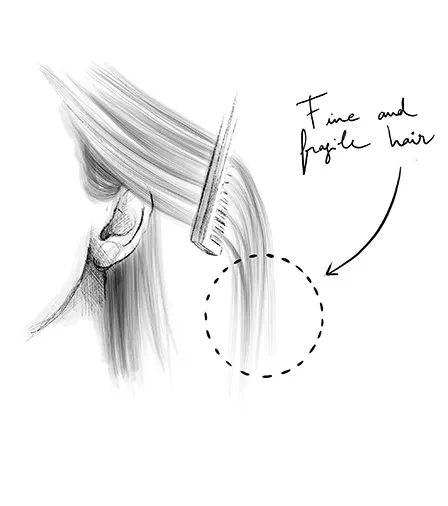Fine and fragile hair
“Fine and fragile hair is characterized by low density and being delicate, prone to breakage. It is characterized by having a small diameter, which gives it less volume. Fine and fragile hair is easily affected by heat, harsh chemicals, and rough styling. To take care of it, it is recommended to use gentle products, avoid excessive heat, and protect it from the sun.”

Paola, 32 years old
Solution to strengthen fine and fragile hair
Everyone likes to show off good hair, but if you have fine hair like Paola, things get complicated. She has always preferred to wear long hair, but because it is so fragile, it doesn't look as good as she would like.
Her friends recommended using extensions, but she wasn't convinced, and when she tried the products from the experts in hair integration systems, Integral Hair, she didn't want anything else.
Treatment for fine and sparse hair
We worked hand in hand with the professionals at her hair centre through Atelier and realised that Paola's problem could be solved with a Collection System that perfectly matched her colour and length, and was designed to increase the amount of hair on the top of her head. We intertwined it with her hair with a micro-perforated weave system, giving a greater sense of density.
The result? The mane Paola dreamt of, with its natural look.
In the case that Paola had suffered from diffuse alopecia or alopecia totalis, the same treatment would have been followed, guaranteeing exceptional results.
-
Frequently Asked Questions about Fine and fragile hair
-
Is Paola's case real?
The case we presented of Paola is not real. It is an avatar or fictional case that illustrates the situation of many users who are in similar circumstances.
-
How is fine and fragile hair characterized?
Fine and fragile hair is characterized by low density, small diameter, and being prone to breakage.
-
What causes fine and fragile hair?
Fine and fragile hair can be caused by genetic factors, damage from excessive heat use, harsh chemicals, lack of nutrients, and inadequate care.
-
How can I take care of fine and fragile hair?
It is recommended to use gentle products, avoid excessive heat, protect it from the sun, avoid harsh chemical treatments, and use moisturizing conditioners.
-
Can fine and fragile hair be strengthened?
Yes, fine and fragile hair can be strengthened through a balanced diet, vitamin supplements, fortifying treatments, and gentle styling techniques.
-
Can the structure of fine and fragile hair be changed?
The natural structure of fine and fragile hair cannot be changed, but products and techniques can be used to improve its appearance and strength.
-
Can stress affect fine and fragile hair?
Yes, stress can contribute to weakening and hair loss, including fine and fragile hair. It is important to manage stress properly to maintain hair health.
-
Can I combine dermatological treatments for fine and fragile hair with the use of Integration Systems?
Yes, it is possible to combine dermatological treatments with the use of hair integration systems to treat fine and fragile hair. Many patients opt for this combination to improve their appearance and self-esteem. It is essential for dermatology and trichology specialists to work in collaboration with experts in hair integration systems to offer personalized solutions to each patient.
-
Can hair transplantation solve my problem of fine and fragile hair?
Hair transplantation can solve the problem of fine and fragile hair. Follicles are extracted from donor areas and transplanted into affected areas, improving hair density and quality. However, it is not suitable for everyone, and professional evaluation is needed. Complementary therapies may be required to strengthen existing hair.
< back